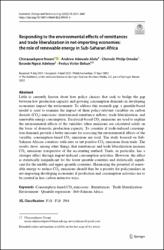Responding to the environmental efects of remittances and trade liberalization in net‑importing economies: the role of renewable energy in Sub‑Saharan Africa

Göster/
Tarih
2022Yazar
Nwani, ChinazaekpereAlola, Andrew Adewale
Omoke, Chimobi Philip
Adeleye, Bosede Ngozi
Bekun, Festus Victor
Üst veri
Tüm öğe kaydını gösterÖzet
Little is currently known about how policy choices that seek to bridge the gap
between low production capacity and growing consumption demands in developing
economies impact the environment. To address this research gap, a quantile-based
model is used to examine the impact of three policy-relevant variables on carbon
dioxide (CO2) emissions: international remittance infows, trade liberalization, and
renewable energy consumption. Territorial-based CO2 emissions are used to explain
the environmental efects of the variables when emissions are calculated solely on
the basis of domestic production capacity. To consider if trade-induced consumption demands provide a better measure for assessing the environmental efects of the
variable, consumption-based CO2 emissions are used. The study focused on SubSaharan African countries with zero or net positive CO2 emissions from trade. The
results show, among other things, that remittances and trade liberalization increase
CO2 emissions irrespective of the accounting method. Trade, in particular, has a
stronger efect through import-induced consumption activities. However, the efect
is statistically insignifcant for the lower quantile countries and statistically signifcant for the middle and upper quantile countries. Harnessing the potential of renewable energy to reduce CO2 emissions should thus be a priority for policymakers in
net-importing developing economies if production and consumption activities are to
be created in less carbon-intensive ways.
Cilt
55Sayı
4Bağlantı
https://hdl.handle.net/11363/6028Koleksiyonlar
Aşağıdaki lisans dosyası bu öğe ile ilişkilidir:

















